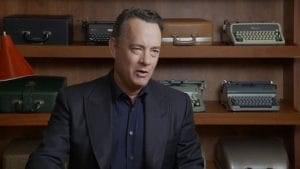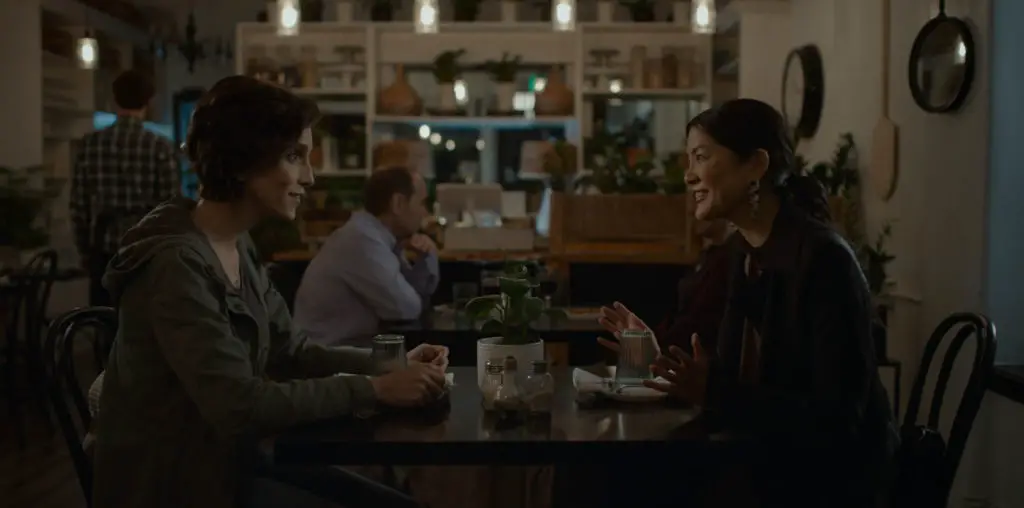
Here in the Bay Area, “tech” is at once a culture, an industry and for some, a way of life. In its most recent form, tech focuses on the constant progression in a tool’s efficiency. Phones become smarter. TV’s become interactive. Apps and websites become more responsive. This insatiable cycle of “ever better!” leaves old technology in the dust, of course. But if you let the many subjects of California Typewriter tell it, maybe this mindset isn’t the best way to go about things. This documentary, by Doug Nichol, is much like the writing technology it profiles: robust, haunting and intricate in its construction. Which is also quite like a great slice of baklava. I’m digressing though.

“California Typewriter makes a compelling case for typewriters by talking to its diverse congregation. ”
At its heart, the film follows the trajectory of a small, black-owned typewriter repair shop– itself named California Typewriter– in Berkeley. Their lead technician, Ken, relates how he has fallen in love with typewriters and their intricacies over his years repairing, sourcing and sale of them with the owner, Herb. It’s a heartwarming narrative that carries the various other side-plots. In its runtime California Typewriter makes a compelling case for typewriters by talking to its diverse and large congregation. We sit in with Tom Hanks and John Mayer, Sam Shepard and David McCullough, then Silvi Alcivar, a local artist who deconstructs typewriters, a fervent collector, and, even a typewriter band. Yes, you read that right: the Boston Typewriter Orchestra creates and performs music with typewriters. And to be clear: that’s just the people I could fit in this paragraph.
Every story explores the relationship between great thinkers and creatives, and this analog, almost arcane technology. At first, it seems like a dalliance that’s quaint and sure to tickle the Brooklyn-y hipster bone in your chest. However, once the film picks up steam however, we’re sucked into the all-encompassing theories and wholly human interactions with these machines. Of course, the irony of relating to a metal box more than a bright, blinking supercomputer the size of a candy bar won’t be lost on you. The documentary seems to argue that whatever we gained with the latest leap in technology, we equally lost the ability to actually be more human; to make mistakes, to be tactile and to ultimately communicate–not efficiently–but beautifully and genuinely. For, as Richard Polt reminds us, it’s not necessarily about making the process of communicating more efficient, but about the enjoying the process itself. Hanks in particular alludes to this when he comments on how he refuses to give people digital thank you notes. For him, a typewritten thank you note–errors and all–relays a care that it takes to prepare said message in “80 seconds” that’s lost in the “8 seconds” it takes to send an email or text.

“The documentary seems to argue that whatever we gained with the latest leap in technology, we lost the ability to actually be more human.”
This ideology, of the craftsmanship of communication itself, is poignant and timely. As we build computers and other human-facing technologies to ease our navigation of ever-more-digitally dependent worlds, it could be argued that we’re losing touch with the actual worlds we live and breathe in. California Typewriter makes it almost painfully evident how that relationship, between ourselves and a physical world, is not just in danger, but vital to our experience as organic, messy beings. It’s a conversation for the ages. And it’s one that is made urgent by the other half of this meta-banter: the typewriter can only live as long as we support it. Throughout the film there is an existential (and at a certain point, very real) threat of losing typewriters to modernity. From Ken’s job to comments on ‘what really makes us creative?’ the film pursues this fear with gusto, unfolding in front of us with a past-present-and-uncertain future approach. Alas, things do end on a solidly positive note. And I definitely hope to hop in my car and drive up to Berkeley, or the Alameda fair, to maybe even buy my own typewriter. But the questions this documentary raises, in between all the human stories and history it teaches, will definitely haunt you as the credits roll.

California Typewriter (2017) Director::Doug Nichol, Stars: Silvi Alcivar, Ken Alexander, Tom Hanks.
4.5 out of 5 typewriters


Am currently half way through this docu and it’s interesting. As one who grew up with typewriters, I have to say that I do not miss them. I’m a graphic designer who learned his trade “on the boards” and as soon as it was possible to work on a Mac, I was on top of it. I am a techno curmudgeon in many other ways, though. I grudgingly made the leap to DVD a few years after it happened. I spent the 80s and early 90s riding the bleeding edge of home video [Superßeta Hi-Fi, ßeta 1s hi-band, S-VHS, Laserdisc, monitors] and I was waiting years for HDTV. Once I stopped watching television that all ended! To this day I lead a SD life. Still watched this DVD on a CRT. How backward can I get?
If you want to really make me boiling mad, talk to me about a world where CDs are vanishing, vinyl [?!] is “back” with expen$ive new pressings of the classic rock I hated as a youth and seriously displacing all the used vinyl I desperately want that never made it to any form of digital. Now even downloads are fading away; displaced by streaming! An all-time worst case scenario where The Man® is in complete control over what you can hear from moment to moment as long as you keep tithing in good faith.
Even my precious computers and design software seemed to have peaked around 2005 and have been going to hell in a handbasket ever since as new and horrible ways to monetize my working have been released from their dark caves like digital krakens to terrorize me. I now “rent” my software. So yes, even though I think the “crackpots” in this docu are barking up the wrong tree [though do date no known typewriter has been keylogged…] I can certainly relate on some, primal level to their angst.